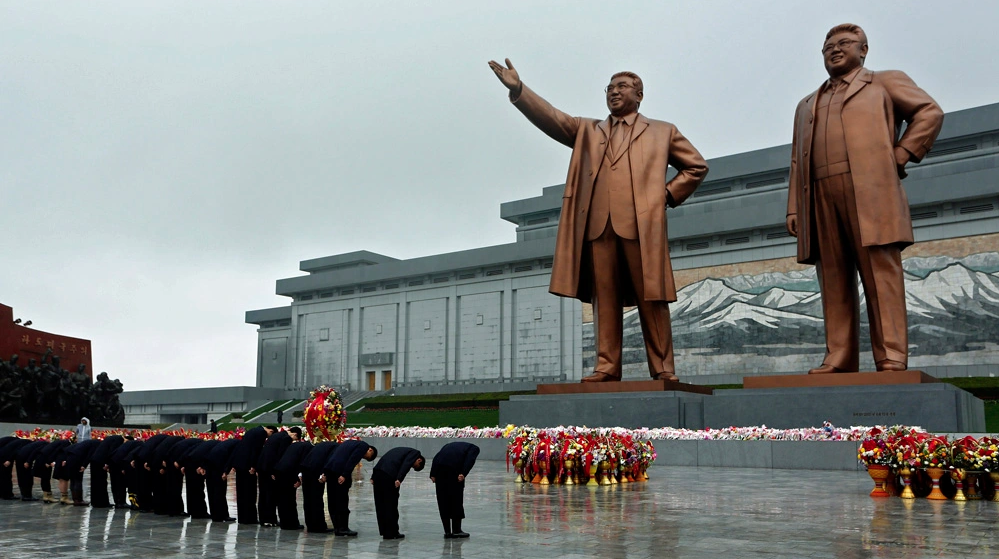JucheBot1988
Kimilsungist-Kimjongilist.
- 18 Posts
- 69 Comments
I personally view it as that if you can’t allow people to see other viewpoints, then material conditions don’t matter.
Said by someone who has never really been hungry,

 4·4 months ago
4·4 months agoAnother brave redditor, speaking from the front lines
New theoretical ground gets broken here every day
Might as well rename this community Qiushi
I picture lemmygrad as being the encyclopedic knowledge of Yogthos coupled with the sardonic wisdom of PolandIsAStateOfMind

 9·4 months ago
9·4 months agoI mean, it wouldn’t be the first time feudal Tibet ended up featuring in Nazi propaganda.
That, or Neturei Karta.
The weird thing is, it’s often been Jewish people who thought I was Jewish. Even when I was with a cousin of mine who’s the most stereotypical-looking midwest Norwegian-American you can think of. I guess I just have an… atmosphere?
For some weird reason, I’ve been mistaken a bunch of times for being Jewish, and have had to “come out” to multiple people on different occasions. (So far as I know, there’s nothing Jewish in my family tree).

 2·4 months ago
2·4 months agoNo problem for the late reply, comrade – mine was very late as well. Glad I could help a little bit! Maybe in ten-fifteen years representatives of both our countries will meet at some world summit of socialist nations. That would be the dream, wouldn’t it?
The Biden Administration’s strategy is now to sustain Ukrainian defense until after the U.S. presidential elections
An interesting admission here. I think this is true, though the real reason has nothing to do with helping Ukraine – it’s about avoiding a political disaster for the Democrats.
Yeah, no. I’m from the states, and these Ukronazi losers can fuck off and pay their own bills. The same goes for Taiwan, Israel, and whatever other meme countries our government and ruling class – the real traitors – are supporting. Americans have their own bills to pay.
Sounds like something a fascist loser, whose country has no production of its own, would say.
Yes, I remember people talking about how Ukraine was “systematically destroying” the Russian army at Bakhmut, and how it was a meatgrinder from which Russia would never recover – in fact the opposite was true. Then (because Prigozhin) everyone was talking about corruption in the Russian military, how Putin’s hold on power was extremely fragile, etc. etc., and saying with utmost confidence that the Summer Counteroffensive (lol) would absolutely collapse that whole house of cards; Ukraine would reconquer Crimea, there would be regime change in Russia, President Navalny would oversee the “total decolonization” of Siberia (also lol). None of that happened either. Plus throughout it all, we were consistently told that if we would just give Ukraine Leopards, Abrams, F-16s, HIMARS, Javelins, Patriot systems, Challengers, cluster bombs, horcruxes, baatleths, sticks and stones, and of course more of that sweet, sweet US taxpayer money, those plucky Ukrainian would beat the Russians in no time whatsoever. Western governments absolutely thought Ukraine could win, and some of the (particularly Britain) are still clinging to that illusion.
My partner and I are anarchists
Ah, now it makes sense.
1460
As a supporter of Ukraine, don’t you mean 1488?
To be fair, “fiery” is not exactly a good description of the boring-ass speeches these geriatric Dem politicians give.
“Is this rare fruit fly the reason why Africa is underdeveloped?”

 2·5 months ago
2·5 months agoI think this is where me being a bit of an oddball comes into play. I am german by birth, but I grew up in Turkey as the lone german in my social network.
Here it gets so messy, because one’s lived experience can alter things a great deal. I think being raised in two cultures like you’ve described can actually be an advantage, in that it lets one see outside the parochialisms inherent in any society. Right-wingers will of course say that such an upbringing leads to liberalism and faux-cosmopolitanism, but everybody in capitalist society is in danger of that; and fascists, in my experience, are some of the worst offenders, the libbiest of cosmopolitan libs. For to talk about the “white race” rather than Germans, Poles, Italians, and so on is after all to engage in the most artificial and idealistic of constructs. I think that, as touchy-feely as it sounds, the important thing is to be true to yourself. Recognize, sure, that your upbringing is unusual, but it’s part of you; embrace both it and the insights it gives.
In a small way, I think, I kind of get where you’re coming from, because I’ve never really identified with mainstream American culture. It’s as you described modern German culture, artificial and imposed from the top. The flag doesn’t stir me; movies aren’t really my thing; and the over-the-top brashness and sexuality of American music really rubs me the wrong way. Plus, the performative nationalism of it all – “we’re the bringers of FREEDOM, Yee-HAW!” – is extremely hard to take seriously, even if you ignore (as most of my countrymen seem able to) the associated crimes and bloodshed. To me, accepting my “American-ness” is sort of like accepting one’s descent from a dysfunctional family. I recognize the horrible problems with this place – the imperialism, racial injustice, settler-colonialism, and so on – but also accept that, like it or not, I am intimately connected with these problems. Thus it is my duty, not to hold myself aloof, but to try in whatever small way I can to fix them. And there are things to love, not the government or the constitution, but certain small material things: night in the great western deserts with the smell of dust and sage, wandering through a small midwestern town at dusk and mingling with the people returning homeward, sitting at a bus stop and talking to the stranger next to you. It’s a strange balancing act, but as a communist I try to maintain it, usually poorly.
typically people see themselves not just as german but as “thuringian” or “swabian”, the less mutually intelligible the dialect the stronger such an identification and the need to feel superior to some other state
Take this for what it’s worth, because I see things purely as an outsider. But I get the sense that German culture, in its authetic form, has always been local, with “German-ness” itself being largely a literary and artistic phenomena. Hence the saying (by Goethe, I think?) that there existed a “Germany of the mind;” i.e., that Germans had no common political identity, but did share a kind of common artistic language, especially where music was concerned. This is a real, though unusual, sort of bond. It was presumed, I think, that this bond would exist through unification and the annihilating of the old feudal order, and modern Germany would usher in a different kind of modernity: fully of the moment, but also in continuity with the past. This did not happen, because the architects of German unification were, like everyone else in Europe at the time, liberals with absolutely no sense of superstructure and base. Hence the odd, pathetic phenomena of World War I era nationalists helming one of the most powerful countries in Europe and at the same time bemoaning the fact that their culture was disappearing. Even in music there is in the late 19th century a steep decline, with Wagner’s Parsifal and Brahms’ German Requiem being a kind of swan song. This is all the result of the attempt to remake Germany in the image of England, a modern liberal, capitalist, and imperialist nation; which attempt culminated in Nazism, and the modern German state with its wholly artificial form, not just of nationhood, but of national identity itself.
(Sorry for the very very late reply – life, work, and the flu all happened together).

 21·5 months ago
21·5 months agoApparently I have been promoted to People’s Commissar on the National Question, and as such I will issue an answer: at least you aren’t American, like I have the misfortune of being. Wear it like a badge of pride.
But seriously, I do always caution people against rhetoric like this:
there is nothing about being german that I find appealling and wouldn’t cast off in moment given the chance
It’s for a couple reasons. First: people mean different things when they talk about “casting off” their nationality, but many of them rest on some liberal notion of a universal subject – the individual, complete in himself, with real essence unshaped by any kind of broader social group. This is un-Marxist, and (for me most convincing) contrary to Juche. I am no racial or national essentialist, but I think you do have to realize, and make peace with, the fact that the particular society you grew up in will always shape the way in which you see the world, and will do so on a deep level. This way of perceiving will often persist through any ideological sea change. Take Russell Bentley, who renounced his US citizenship to fight for an independent Donetsk: despite being a communist and pro-Russian, the guy is as American as they come. It comes through in any discussion he has or anything he writes.
Second, when you conflate a people with its government, you cede ground to the enemy. (I’m talking here about a legitimate, materially-constituted nation, not an artificial construct like Israel – or indeed the US as one entity). In the history of any genuine country, there is always something to be proud of: it may be great, it may be small or meager, but it serves as a germ of the future. It is up to communists of every nation – Germany or anywhere else – to discover what is progressive and of substance in their history, and to seek its fulfilment in the present. Which is why I give no prescriptions, other than to say that yes, Hitler was German, but so were Marx, Hegel, Engels, Goethe, Bach. And that the yankee influence in your country really needs to go.
(You can maybe see how uncomfortable I feel writing this. EDIT: Not because it’s a question that shouldn’t be addressed, but more because it makes me a Yank dictating culture to other people, and my government already does way too much of that).
… and teach them about the Eternal Sun of Mankind and the immortal Juche Idea so that they grow up to serve the Party and advance the cause of communism all over the world in the era of independence.


 4·7 months ago
4·7 months agoThis is not quite the insult you think it is.





Me cracking theory and history books trying to figure out why Britney Spears is included in that lineup